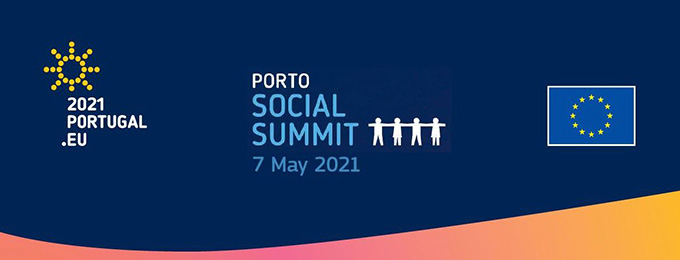EU leaders, Member States and social partners join hands to implement the European Pillar of Social Rights Action Plan to build a stronger social Europe.
The Porto Social Summit was one of the most anticipated events organised by the Portuguese Presidency of the Council of the European Union. One of the main goals was to set the European social agenda for the next decade and to strengthen European citizens’ confidence in the green and digital transitions as paths towards social inclusion and equality. The Summit began on 7 May 2021 with a high-level conference that focused on the best way to implement the European Pillar of Social Rights Action Plan, presented by the European Commission (EC) on 4 March 2021 (see SwissCore article). It started and ended with plenary sessions as well as thematic workshops on employment and jobs, skills and innovation, and welfare and social protection. The discussions during the first day were taken into consideration for the second day of the Summit on 8 May 2021, when the Informal Meeting of EU Heads of State or Government took place. Charles Michel, President of the European Council, chaired this meeting where EU leaders debated on how they can give the European Pillar of Social Rights the highest political impetus.
The Porto Social Summit follows the 2017 Gothenburg Social Summit, where the twenty principles of the European Pillar of Social Rights were declared for the first time. Education has a pivotal role in this Pillar, in fact, the first principle states that everyone has the right to quality and inclusive education, training and lifelong learning to help them fully participate in society. The eleventh principle focuses on children’s right to affordable and good quality early childhood education and care. Reflecting on the links between Gothenburg and Porto, the Prime Minister of Sweden Stefan Löven insisted on the most important reason to host the Summit: improving the lives of European citizens, also in light of the current global health crisis. In the same context, EC Commissioner for Jobs and Social Rights Nicolas Schmit highlighted how the economic and social dimensions of recovery are two sides of the same coin. Social rights and protection need to be taken into consideration for every European citizen to successfully re-enter society and the twenty principles of the Pillar need to be turned into real policy measures felt by all citizens. Schmit cited the Pact for Skills as one of the EC’s key initiatives to address societal challenges such as the issue of skills gaps and mismatches (see SwissCore article).
During the final joint press conference, President of the European Commission Ursula von der Leyen stated that the biggest difference between Gothenburg and Porto is that they have now moved from principles to actions. This is accentuated with the Porto Social Commitment that was signed by all the social partners and civil society organisations present at the Summit. It offers concrete approaches on how to implement the European Pillar of Social Rights and how to recover from the COVID-19 pandemic in the most inclusive, sustainable, jobs-rich and just way. The Commitment calls on the European Council to endorse the principles under the Pillar and to promote the three main targets set in the Action Plan. Member States, on the other hand, should set national targets that allow them to contribute adequately to the achievement of the overarching European targets. Progress will be monitored in the framework of the European Semester and its tools, like the renewed Social Scoreboard.
During the Informal Meeting of Heads of State or Government, a second document was adopted: the Porto Declaration. The declaration places education and skills at the centre of the EU’s action to ensure an inclusive recovery and to adapt to the challenges of the green and digital transitions, including a quickly evolving labour market. Thus, the Member States insist on investing in education, vocational training, lifelong learning, up- and reskilling to stimulate employment transitions to areas that will offer more employment. The Declaration further focuses on the support of young people, who have been one of the most affected groups by the COVID-19 pandemic. The crisis not only influenced their education and training plans but also their engagement in the labour market. Young people are the force of the green and digital recovery, and programmes like Erasmus+ should help foster interactions and mobility across Europe to build an inclusive and just future.
In his closing remarks, Charles Michel supported the social partners’ view that Member States’ development should be measured not only taking into account gross domestic product (GDP), but also relevant criteria such as access to education, capacity for innovation and curbing discrimination. Recently, we have seen the EC moving forward in this field, for example with the European Child Guarantee, adopted on 24 March 2021, which wants to ensure that every child has access to a good quality life. In the upcoming months, we can further expect the adoption of a European Action Plan for the Social Economy. This initiative wants to enhance social investment and to boost the growth of social economy organisations in order to create jobs and upscale innovation. Other key actions include initiatives on individual learning accounts and on micro-credentials, both intended to help up- and reskill European citizens.

